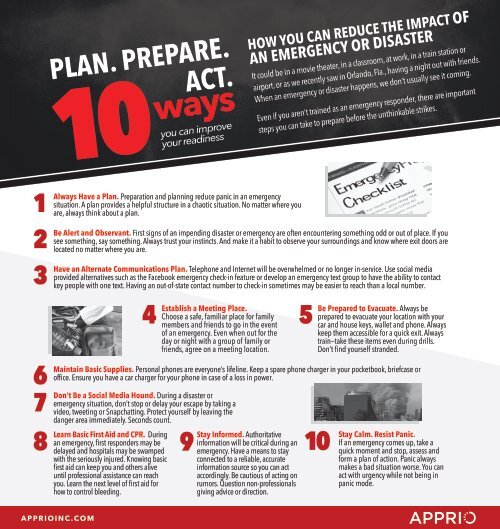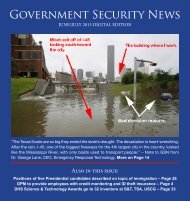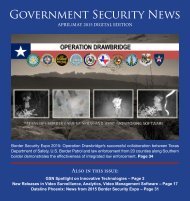GSN Magazine June 2016 Digital Edition
Create successful ePaper yourself
Turn your PDF publications into a flip-book with our unique Google optimized e-Paper software.
PLAN. PREPARE.<br />
ACT.<br />
10 ways<br />
you can improve<br />
your readiness<br />
HOW YOU CAN REDUCE THE IMPACT OF<br />
AN EMERGENCY OR DISASTER<br />
It could be in a movie theater, in a classroom, at work, in a train station or<br />
airport, or as we recently saw in Orlando, Fla., having a night out with friends.<br />
When an emergency or disaster happens, we don’t usually see it coming.<br />
Even if you aren’t trained as an emergency responder, there are important<br />
steps you can take to prepare before the unthinkable strikes.<br />
Always Have a Plan. Preparation and planning reduce panic in an emergency<br />
situation. A plan provides a helpful structure in a chaotic situation. No matter where you<br />
1 are, always think about a plan.<br />
Be Alert and Observant. First signs of an impending disaster or emergency are often encountering something odd or out of place. If you<br />
see something, say something. Always trust your instincts. And make it a habit to observe your surroundings and know where exit doors are<br />
2 located no matter where you are.<br />
Have an Alternate Communications Plan. Telephone and Internet will be overwhelmed or no longer in-service. Use social media<br />
provided alternatives such as the Facebook emergency check-in feature or develop an emergency text group to have the ability to contact<br />
3 key people with one text. Having an out-of-state contact number to check-in sometimes may be easier to reach than a local number.<br />
6<br />
office.<br />
7<br />
8<br />
Learn<br />
4<br />
Maintain Basic Supplies. Personal phones are everyone’s lifeline. Keep a spare phone charger in your pocketbook, briefcase or<br />
Ensure you have a car charger for your phone in case of a loss in power.<br />
Don’t Be a Social Media Hound. During a disaster or<br />
emergency situation, don’t stop or delay your escape by taking a<br />
video, tweeting or Snapchatting. Protect yourself by leaving the<br />
danger area immediately. Seconds count.<br />
Basic First Aid and CPR. During<br />
an emergency, first responders may be<br />
delayed and hospitals may be swamped<br />
with the seriously injured. Knowing basic<br />
first aid can keep you and others alive<br />
until professional assistance can reach<br />
you. Learn the next level of first aid for<br />
how to control bleeding.<br />
Establish a Meeting Place.<br />
Choose a safe, familiar place for family<br />
members and friends to go in the event<br />
of an emergency. Even when out for the<br />
day or night with a group of family or<br />
friends, agree on a meeting location.<br />
9<br />
Stay Informed. Authoritative<br />
information will be critical during an<br />
emergency. Have a means to stay<br />
connected to a reliable, accurate<br />
information source so you can act<br />
accordingly. Be cautious of acting on<br />
rumors. Question non-professionals<br />
giving advice or direction.<br />
5<br />
Be Prepared to Evacuate. Always be<br />
prepared to evacuate your location with your<br />
car and house keys, wallet and phone. Always<br />
keep them accessible for a quick exit. Always<br />
train—take these items even during drills.<br />
Don’t find yourself stranded.<br />
10<br />
Stay Calm. Resist Panic.<br />
If an emergency comes up, take a<br />
quick moment and stop, assess and<br />
form a plan of action. Panic always<br />
makes a bad situation worse. You can<br />
act with urgency while not being in<br />
panic mode.<br />
APPRIOINC.COM







